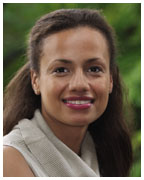Photo by Ricardo Barros |
Alexis McGill ’93
About a year ago, Alexis McGill ’93 left her position as visiting professor at Wesleyan to run the Hip-Hop Summit Action Network, an organization created by hip-hop producer Russell Simmons to increase voter registration among young African-Americans. She recently became political director at Citizen Change, a nonpartisan group founded by Sean Combs, better known as hip-hop impresario “P. Diddy.” McGill spoke to PAW’s Mark F. Bernstein ’83.
How did you go from teaching African-American Studies at Wesleyan to running a political-action committee?
I had written an article in 2002 for Savoy magazine about a political-action committee Russell Simmons had started. I saw Russell’s PAC as one of the first instances of the hip-hop generation engaging in electoral politics. I got excited about that and thought, what if we could turn the hip-hop generation into the NRA? How do you create a lobbying arm of this movement so that it really changes political participation by young African-Americans? That led to the creation of the Hip-Hop Summit Action Network.
How do you define the “hip-hop generation”?
Our best interest is always to leave it vague. It’s certainly a group of people who have grown up around hip-hop music, but it crosses race and class. Most hip-hop is bought by suburban white teenagers but the authenticity still derives from the inner-city experience. One of the real contributions of hip-hop has been creating a sense of linked fates between communities that otherwise wouldn’t exist. Even though there may be somewhat segregated listening environments, it’s breaking down boundaries.
Do you see parallels between organizing the hip-hop vote today and the drive to register black voters during the 1960s?
We know that the civil-rights movement was organized through indigenous institutions like the church. What are the indigenous institutions in the hip-hop community? From a cultural standpoint, it’s primarily the cultural and fashion labels that are owned by the cultural icons. So, how do you tap into that existing marketing apparatus to push a political message? Citizen Change is really predicated on Sean Combs’ ability as a marketer. He wanted to treat the vote as if he were marketing Spiderman and had three weeks to get the message out with a sense of urgency.
What are your goals for Election Day?
There were 18 million people between 18 and 30 who voted in the last election. We’re trying to push that to over 20 million. We also recognize that we need to be players in the swing states to make real change, to legitimize ourselves. We’re focused on markets.
How politically active are members of the hip-hop community?
Not very. And that’s an eye-opener. The first time Sean Combs voted was in 2000, when he was 31 years old. There are a lot of people who never felt that their vote mattered. There are a few people in hip-hop who participate in the process regularly, but for every one who does, there are three or four more who really haven’t been engaged.
What are some of the challenges you face trying to get people who register to actually go to the polls and vote?
There’s a lot of miseducation. People may have registered 10 years ago but have since moved five times or changed their names, and just assumed that their names would still be on the rolls. The most effective ways to educate people about what they need to do to vote are through local radio and with volunteers who can put up signs around town. We have networks of young people who can blanket a city in a matter of days, talking to the store owners, churches, and barbershops, and those places can then pass the information on.
Citizen Change is nonpartisan in urging people to vote, but are you really indifferent as to which candidate receives those votes?
No, but you have to be able to claim victory whoever is in office. You can’t be beholden to a party that takes you for granted and you can’t allow another party to ignore you. Because people in marginalized communities often find themselves in that position, this effort is really about how we create a group that can be a swing vote. So instead of talking about soccer moms and NASCAR dads, we’re talking about what young people and people of color are doing.
Are you going to return to teaching after the election?
I don’t know. When I was teaching, I used to say: You have this
race, this gender, this class, you put it in this district and you come
out with this vote. But there’s no way to quantify the drama on
the ground that goes into that black box. Seeing what it takes to move
people, and where people really are as far as what they’re concerned
about in their lives, has been such an invaluable experience that I definitely
want to continue building the organization. ![]()


